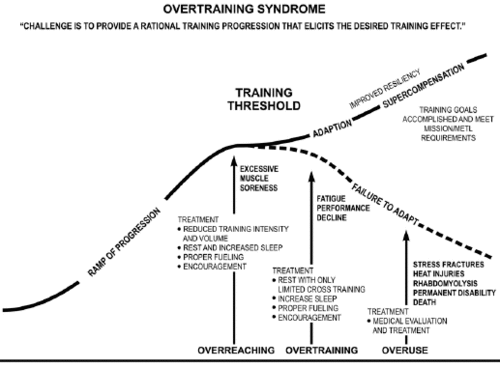I’m sure we’ve all heard this oft-referenced Einstein quote before: “The definition of insanity is doing the same thing over and over again and expecting different results.”
Well, the evidence is clear. I’m officially insane.
Einstein seems to have been right about everything (I’d like to point out that he was also a very strict vegetarian).
I encountered my first brushes with overtraining during my second year of medical school. A combination of intense, drawn-out, daily trail runs and mounting stresses from my life outside of the mountains ended up being a recipe for disaster. Hugely in denial, reluctant to give up the one thing I felt was serving me at the time (trail running), and being the know-it-all med student I was (smack in the middle of my endocrine unit, nonetheless), I did what any running addict would do: I just kept running.
They say hindsight is 20/20, and in retrospect, I recognize today just how stupid this was. I had all of the classic symptoms of what is referred to in the sports medicine literature as uncompensated overreaching-induced overtraining syndrome: debilitating lethargy, complete lack of motivation, mental fog, slowed heart rate, orthostatic hypotension (e.g. “seeing stars” every time I stood up), decreased appetite, and fitful, unsatisfying sleep. Basically, the concept here is that if an athlete does not compensate (a.k.a. “rest”) after overreaching (a.k.a. pushing hard for a couple of days or even a week), an almost inevitable outcome is insurmountable stress overload on the body: hormonal systems are suppressed, neurotransmitters shut down or dysregulated entirely, oxidative damage skyrockets, inflammation goes unchecked, and a deep, unshakable fatigue settles into the very bones of one’s body. It really kind of sucks.
The physician in me knows today—and even back then, knew—exactly how to remedy this. It was fairly clear that I was in the early stages of some sort of adrenal insufficiency, and perhaps even hypothyroidism, induced by overtraining, and the natural sequela would be Addisonian Crisis if I didn’t just stop, take the time to recover, nourish my body appropriately with rest, nutrition, and adaptogens, and re-hash my approach to running and training. Instead, I’d down a couple of cups of black coffee, take a pretty heavy-hitting dose of Siberan Eleuthero, and be jazzed up enough to convince myself I was fine.
I rarely felt bad during a run. But it was afterward that I’d feel like I’d been hit by a bus.
I employed stopgap therapies to try and fix the problem while still being able to run large volumes on a daily basis. I took supportive, adaptogenic herbs by the fistful. I set an early bedtime and tried to force myself to sleep for 9, 10, 11 hours a night. I took melatonin, licorice, ginseng, ashwagandha. I even stopped being vegan and started eating meat and eggs for a period of about four months. I only felt worse.
The answer was clear: I needed to rest. By six months into my stint with chronic overtraining, I had read nearly every medical journal publication out there on the subject. I was an expert. Every description pointed to exactly what I was experiencing. And the recommendations at the end of each publication were unequivocal: rest was the primary solution. In some cases only a few weeks of rest do the trick; in others, athletes toe the line between chronic burnout and wellness for years or even decades. Years? Decades?! Even the concept of weeks was unfathomable to my endorphins-hooked brain.
Rest was never an option for me. If I stopped being my endurance junkie self—admittedly, an enormous slice of my identity—then just who would I be?
I would be just another twenty-something girl. Just another medical student. Just another sister, daughter, friend, and girlfriend. While I appreciate these aspects of my identity enormously, I can’t help but admit that they feel frighteningly banal in comparison with my identity as an endurance sport lover.
So what did I ultimately end up doing? I continued to live in denial for another year or so, but during the spring of 2013 my behavior caught up with me. At the time, I was living in New York, but flew back to San Francisco to attend to some school-related things and visit my sister. I distinctly remember feeling so tired, so foggy, and so out of it while I was there. I could hardly motivate myself to get up from the chair I was sitting in. Climbing up a small hill in Bernal Heights Park—a hill that normally would seem like child’s play to me—I felt my heart thumping wildly in my chest and my blood pressure dropping precipitously. I felt so weak that I was sure I was going to pass out. While everyone else around me was enjoying the view and enjoying their lives, I was seeing stars and wishing I could crawl under the covers. That was the catalyst. When I flew back to Connecticut to spend a few days with my parents, I completely broke down, and resolved to give several weeks of rest a genuine try.
It was extraordinarily difficult at first, and I have to admit, it didn’t get much easier. As someone who has grown psychologically accustomed to being very physically active on a daily basis, putting the lid on training for a while was agonizing. I traded my long runs for long walks and long cuddle sessions on the couch with my dog. I dabbled in gentle and restorative yoga. I drank green juices and ate avocados by the bushel. All the while, I felt mentally restless. It was hard to see my running shoes stare up at me from the depths of my closet floor each morning. I had to put them in the basement.
I took some time to rest last summer, and got back into the swing of things last fall. Yet, like any endurance junkie, my tendency to overdo things—without realizing I’d overdone it until far, far after the fact—got the best of me. So here I am, in January, looking back at my insane training log from November and December and, from a logical perspective, not wondering in the least how I’ve managed to find myself in the same exact predicament.
Remember that definition of insanity? Yeah, that’s definitely me.
So what conclusions have I come to as a result of experiencing this? And what advice would I give?
Well, for one, overtraining is definitely a very real thing—and not something to be messed with. Secondly, I think it’s critical that anyone involved in very taxing and stressful endurance sports on a regular basis honestly assess his or her ability to cope with stress, period, at any point in life. At the time when I first began experiencing symptoms, I was puzzled as to why—I had, after all, had no problem recovering from similarly intense levels of activity in previous years. Why such a sudden and drastic shift? It is now clear to me that the non-physical stresses in my life at the time–the unending demands of medical school, the sadness of a failing long-term relationship, confusion and distrust of my own body through experiencing illness–were all taking an enormous amount out of me as it was. Add to that the stress of endurance exercise, which is well-documented to interfere with some of the body’s most vital functions, and overtraining becomes a distinctive possibility.
As I’ve opened up to friends and family about this rather humbling experience, I’ve been met time and time again with a very similar response: “Imagine how much better of a doctor this will make you!” Very true words, but they don’t console the fact that I can’t bust out 18-mile runs every day a la Dean Karnazes. Bummer.
Alas, I suppose I am only human after all. I guess I actually do have to take rest days.
The question, then, is this: what to do with all of the extra free time I’ll gain by having rest days?
Maybe go swimming?
Meh, once an addict, always an addict…


